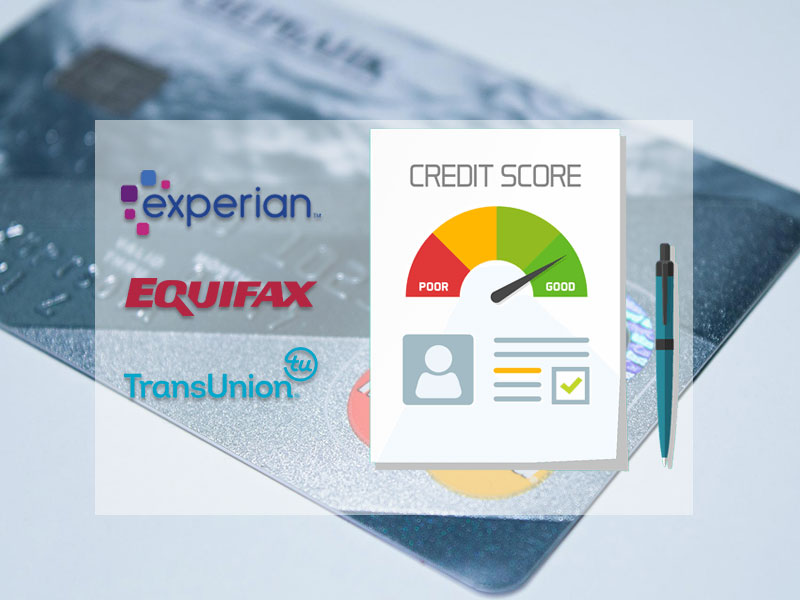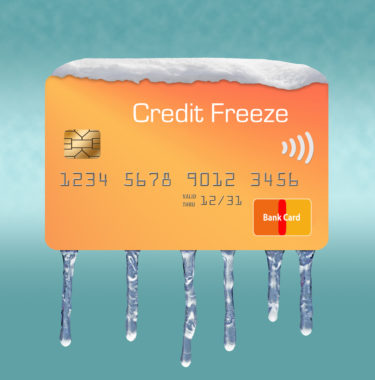
A credit score is a dreaded number for some and a point of great pride for others. The number is often a defining attribute of loan approvals and mortgage rates. Still, the source of the calculation remains shrouded in mystery for the average consumer, as do the 3 credit bureaus responsible for it.
To understand your credit score, you must understand the bureaus. These organizations analyze your debt-to-income ratio and other financial indicators differently. If you want to improve your scores and get a leg up financially, you need to delve into each bureau and learn how they operate and influence your future borrowing potential.
Table of Contents
Identifying the 3 Credit Bureaus

When people discuss credit bureaus, they typically talk about Experian, TransUnion, and Equifax. These bureaus provide the most extensive data pool of consumer credit use, making each an invaluable tool in determining creditworthiness.
All consumers with a credit card, auto loan, or mortgage likely have a credit file with one or more of the main bureaus.
The bureaus are also called credit reporting agencies and can sell and collect your credit information without consent. However, lenders and businesses cannot access your file without a legitimate reason.
The bureaus can collect a variety of information about your credit history. The information gathered is usually used for one of several reasons, such as:
- Calculating credit scores
- Making lending decisions
- Completing pre-employment background checks
- Setting insurance rates
- Evaluating lease applicants
- Deciding the need for a utility deposit
Experian
Founded in 1996 in Dublin, Ireland, Experian resulted from the merger of two other finance companies. In 2007, Experian acquired a controlling interest in the fourth-largest credit bureau, Serasa, granting the company a stronghold in one of Brazil’s fastest-growing markets.
The company manages the data of 145 million companies and 1.2 billion people globally. Experian uses both VantageScore and FICO scores. VantageScore is the industry-standard model, while FICO is a bureau-specific score, meaning it is different from the other two scores from TransUnion and Equifax.
Every score means something different. With Experian, the scores range from poor to excellent:
- 300-579 = Poor
- 580-669 = Fair
- 670-739 = Good
- 740-799 = Very good
- 800-850 = Excellent
Transunion
Starting as the Union Tank Car Company in the 1960s, TransUnion evolved in 1968, acquiring the Credit Bureau of Cook County in 1969 and becoming one of the first national organizations out of the 3 credit bureaus. The company presents itself as a consumer-friendly and focused operation.
TransUnion uses VantageScore 3.0 to calculate consumer credit scores. The score focuses primarily on financial and credit history, factoring in many items, including:
- Bills paid on time
- Percentage of credit use
- Type of credit
- History of credit
- Frequency of credit applications
Unlike Experian, TransUnion uses a grading model for credit score. You can receive a grade from A to F depending on your score:
- 781-850 = A
- 720-780 = B
- 658-719 = C
- 601-657 = D
- 300-600 = F
Equifax
Founded in 1899 as the Retail Credit Company, Equifax is the oldest of the 3 credit bureaus and is headquartered in Atlanta, Georgia. The company manages more than 400 million consumer credit profiles worldwide.
Like Experian and TransUnion, Equifax uses FICO and VantageScore models to calculate consumer credit scores. The company uses a similar rating system to Experian, meaning specific scores rate from poor to excellent.
Typically, a 700 is a good score with Equifax, while anything below that will need work to access a full range of financial products.
Whereas TransUnion is primarily focused on credit history, Equifax takes into account a broader picture. The company considers many things when calculating a consumer’s score, including:
- Employment
- Income
- Credit
- Finances
- Demographics and marketing
- Public record
Understanding How the 3 Credit Bureaus Collect and Maintain Data
When looking at a credit report, you might feel a little unnerved. After all, while you have taken out loans, bought a car, rented an apartment, etc., you probably have never given a credit bureau your information personally, nor have you given consent for the bureaus to collect data on your behalf.
As strange as it may seem, especially with such personal data, the credit bureaus do not need your permission to gather or even sell your information. The bureaus collect and maintain various facts about you, including your Social Security number, birthday, and past and present addresses.
While this may seem concerning for the security of your identity, the Fair Credit Reporting Act regulates bureaus and the collection and use of your data.
Data Collection
The 3 credit bureaus do not have to do much digging to collect most information on consumers. Most creditors or lenders willingly provide information to the credit bureaus because they use the bureaus to determine the creditworthiness of applicants.
Therefore, the bureaus gain access to your information because creditors report the information that you gave to them. The details provided to the bureaus typically include payment history, account numbers, total debt, and delinquency. Not all creditors report to all bureaus, and they are not required to report to any.
Additionally, not all accounts are routinely reported, such as rent and utilities. However, if a tenant or consumer is regularly late or significantly behind in payments, the account holder might report the issue.
Bureaus also collect information from public records. Most of this data is not positive, such as:
- Foreclosures
- Repossessions
- Bankruptcy filings
Data Maintenance
The credit bureaus do their best to maintain accurate and relevant data. Unfortunately, the organizations rely on third-party data and reporting, meaning that items on a report are sometimes incorrect or outdated. Just as creditors are not required to report missed payments or accounts, they are not required to report any settlements or resolutions.
As a consumer, you need to watch your credit report to ensure no outdated information reduces your scores. If you work with a creditor to settle or close a debt, ask to report the change to the bureaus. Often, creditors will oblige, but if they don’t, you can dispute the standing claim.
Understanding How the 3 Credit Bureaus Create a Credit Score
Each credit bureau uses FICO (Experian’s system) or VantageScore (created jointly by the bureaus) to calculate your credit score. The precise formula is proprietary, but each considers various aspects of a consumer’s credit history and finances.
As a consumer, you have some control over your credit scores. You can ensure your bills are paid on time and in full. Additionally, you should check your reports, looking for any inaccuracies. Many consumers look at their reports only once per year, but you should get in the habit of checking more often than that.
Finally, it is vital to understand that all 3 credit bureaus are different entities; therefore, the scores you receive from one might not match the others. To ensure accurate reporting, try to gain access to all three reports throughout the year.
Reports vs Scores
The law requires that credit bureaus grant consumers access to the information on their credit reports, but it does not demand bureaus provide credit scores. While you frustratingly may not be able to access your credit score through the bureau websites, you can use other tools to view your scores, such as personal finance websites or sites like Credit Karma.
Many of these options are free. Some credit card companies even include free access to your scores and reports with their service.
Regardless of how you get your information, vigilance is important. You need to observe and maintain your report to ensure you have the highest score possible.
Variations and Scores
While all 3 credit bureaus use FICO and VantageScore, each company has a different proprietary method to achieve a final calculation or score. Because the mathematical formulas applied are not identical, you will notice variations in your score across the three organizations.
Additionally, scores vary because of the datasets each bureau is working with. Remember, not every creditor has to report to the bureaus, and even those that choose to report your information do not have to report to every bureau.
Therefore, some bureaus will be working with different data than others, skewing the number and creating variation between the companies.
Access to Your Scores
Every year, consumers are allowed one free report from each of the 3 credit bureaus. You will want to check the information on each report because each bureau is probably working from a somewhat unique dataset. Scan the reports and confirm the information throughout.
Remember, your credit score is not a part of the free annual report. If you want to check your numerical credit score itself, you will need to pay for it or find some other free service that will provide it.
You can gain access to your three reports through the government-provided website AnnualCreditReport.com. The credit reports typically cover more than two years. Make sure to scan the entire document and verify all the information. If you encounter an error, be sure to notify the proper bureau.
Notifying the 3 Bureaus of a Mistake
If you notice a mistake on one or more of your credit reports, you can file a dispute. You must file the dispute with every bureau that has the error on record because the bureaus are independent of each other and do not share information between them.
Filing a dispute is similar at each organization, but it is crucial to understand any differences in the procedure. When filing a dispute, you want to follow the specific organization’s instructions to the letter. If you fail to complete the dispute process correctly, the mistake will remain on the report, continuing to degrade your score.
Experian
Each of the 3 credit bureaus has an online option for users who feel more comfortable on the internet. The easiest way to file a dispute with Experian is through its online dispute portal. You will need to register with the company before proceeding into the portal. Once registered, you can log in to the platform and select the items you wish to dispute, upload supporting documentation, and send the report to Experian for review.
If you prefer, you can dispute discrepancies in your report by mail. You will need to send your dispute letter to Experian, P.O. Box 4500, Allen, TX 75013. In the letter, you will need to include several items:
- Full name
- Social Security number and birthday
- Address
- Copy of government-issued I.D. card
- Copy of bank, utility, or insurance statement with name and address
The letter must specify which items on the report are in dispute. You should include account numbers and copies of any paperwork.
TransUnion
TransUnion also has an online dispute portal for consumers and requires registration to access it. Once inside the portal, the process is straightforward. You need to click the “request investigation” button nearest the item and provide additional information.
If you prefer traditional mail, you will need to send a dispute letter to TransUnion Consumer Solutions, P.0. Box 2000, Chester, PA 19016-2000. In the letter, you must include:
- Your Name
- Social Security number and birthdate
- Current address
- Company name and account number or disputed item
- Reason for the dispute
- Correction to personal info
Equifax
Again, the fastest way to dispute something on your Equifax credit report is through its online dispute portal. You will need to provide materials to support your claim, including:
- Proof of identity
- Canceled checks
- Credit card statements
- Utility bill
Once you dispute an item, Equifax provides you with a 10-digit reference number. The number can be used to check the status of your dispute. Equifax will notify you when they make a decision.
You can also send a dispute letter to Equifax, P.O. Box 740256, Atlanta, GA 30374-0256. The letter must include:
- Name
- Birthdate
- Social Security number
- Equifax report confirmation number
- Reason for dispute
Keeping an Eye on Your Credit
The 3 credit bureaus provide essential information to lenders about creditworthiness. By checking your reports and credit scores, you can make sure you are receiving an accurate evaluation when you apply for a loan or other financing. Check out Fiscal Tiger to learn more about these bureaus and their vital reports.




